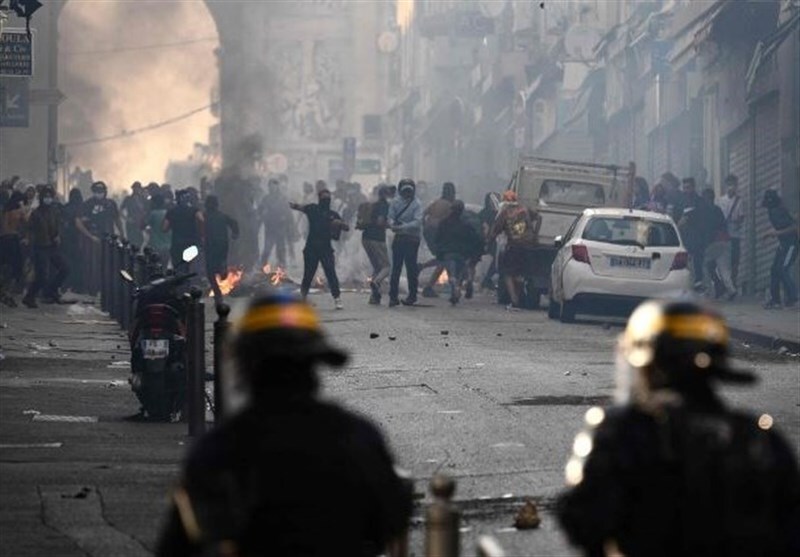In an interview with the website of the Strategic Council on Foreign Relations, Dr. Hadi Dolatabadi referred to the severity of unrest and mass protests in France and that the murder of a 17-year-old teenager of Algerian origin by the police of that country led to the tightening of security measures in the cities, stated:
After World War II, France had problems with its colonial countries, including Algeria, which it barely lost, and it can be said that the rise of the French Fifth Republic was associated with the independence of Algeria. After these developments, many immigrants came to that country, and France was reconstructed after the war with the presence of immigrants and foreign workers. Immigrants who are mainly from the former colonies of that country, especially from North African countries, and were socially at a low level and from the working class.
Saying that over time those workers brought their families to France, and in addition to the presence of the working class in immigrant areas, illegal immigrants were also added to it; he continued: This class has gained such a foothold in France that now there are about four to five million Muslims in France and the vast majority of them belong to this group. One of France’s problems with this group is that it has been unable to achieve social integration with these people. In 2005, during similar events, France experienced agitated conditions, and those conditions were managed with high violence.
The analyst of France affairs continued: In fact, the bullet that was shot at that 17-year-old teenager did not only aim at him but all those who have been living in the suburbs of large French cities for decades with social injustices and latent discrimination. Most people who live in the suburbs of Paris and the big cities of France are immigrants who have been unable to adapt to society because of the social stratum in which their parents are located. Society has reciprocally imposed this backwardness. Teenagers in those families witness that even though their family members are highly educated, they cannot get proper jobs because of their immigrant status.
Stating that those people have gradually become frustrated with education and have created a weak social stratum, Dolatabadi noted: Although in some periods, people from these North African immigrants were present in the cabinet of governments in France, France uses them as a showcase for its government, and by the way, those people have sometimes imposed more restrictions against immigrants.
The Tehran University professor, saying that France is experiencing a profound social gap, added: Now in France, we are witnessing that protesters against police brutality and its racist behavior in killing a teenager are using this platform of protests to damage private property. This situation has caused the dissatisfaction of a large section of French society and provoked their anger. The social gap in France is strengthening, as the right and left parties in that country have shown a completely different view of those events.
He pointed to the protests of the French left parties regarding the use of excessive violence by the police. He said: Considering that France considers itself the leader of human rights, it is going through a difficult situation. While the country’s government is trying to maintain public order and security, the political lack of security contributes more to the power of the extreme right in that country; because the extreme right has extreme positions against immigration, Muslims, and even financial aid to some immigrants.
The expert on France affairs, remembering that the average age of the participants in the protests is estimated to be 17 years old, which is under the legal age, added: Racial violence and widespread suppression of protests will damage the international image of France. The type of management of this crisis, its prolongation, and the damage done to public property affect the image of that country; At the same time, the United Nations also expressed concern over the unrest and asked Paris to seriously address the severe problem of racial discrimination and racism in the police of that country.
Saying that these will have an impact on the image of France in the international arena, Dolatabadi continued: The duration of the management of this crisis has a significant impact on the image of France. A day after this incident, Macron tried to reduce the fire of the protests by taking a quick stance. It did not consider the killing of the immature person to be justified, but this action was not effective enough. It did not decrease the suppressed anger of those sections or the emotions that some teenagers on this platform are looking to experience.
Referring to the positions of some European countries regarding the unrest in France and the violence of that country’s police against them, he said: It is not yet clear how long such protests will continue. However, the gap in French society has become more apparent, and a large part of French society is also against the protesters. The extreme right-wing, which won more than 40 percent of the recent elections, won the votes of people who are potentially against immigrants and who are against the people who are still leading the protests.
The university professor added: The government and society cannot give the concessions they gave to the yellow vests to these protestors; inevitably, these protests must end only by force and police brutality. This duality leads French society in a direction where the gaps will continue to intensify. It remains to be seen where the confrontation of force and protests will reach in the coming days.










0 Comments